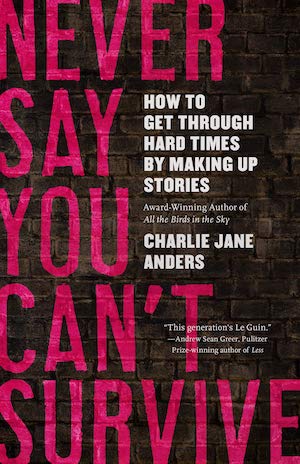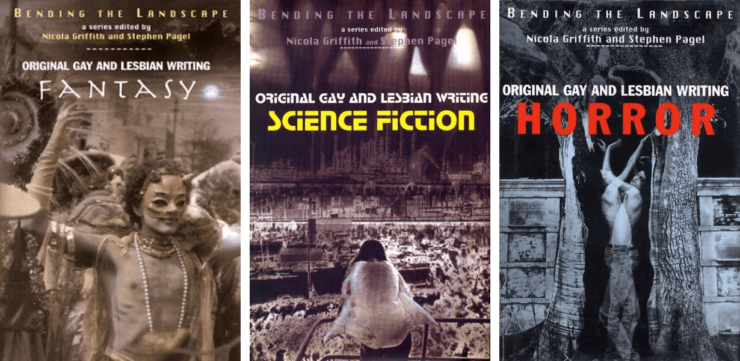It’s been nearly 25 years since the first volume of the Bending the Landscape anthology series came out. (My copy says “copyright 1996,” but I guess it actually came out in early 1997.) And it’s hard to remember just how ground-breaking a whole anthology of LGBTQ+ speculative fiction stories felt at the time, now that we’re living with a wealth of queer SFF content. Editors Nicola Griffith and Stephen Pagel edited three Bending the Landscape volumes, separately devoted to fantasy, science fiction and horror, and along the way they launched authors’ careers and garnered tons of award nominations. Here’s the inside story of how a scrappy anthology series helped to change speculative fiction forever.
There’d been a few towering works of queer speculative fiction, especially in the 1970s, by authors such as Samuel R. Delany, Joanna Russ, David Gerrold and George Nader, of course. But a set of anthologies of explicitly queer SF still felt like a huge big deal in the late 1990s, a jolt to a genre community that was largely dominated by cishet creators. The response was overwhelming: the first volume won a World Fantasy Award and a Lambda Literary Award, and the ensuing volumes won Lambda Literary and Gaylactic Spectrum awards. These volumes conjure a sense of strangeness and dislocation that mirrors the experience of being queer in the age of “Don’t Ask, Don’t Tell,” and exploit the tropes of rising genres like transgressive queer lit and urban fantasy to worthy effect.
Like so many worthwhile projects, Bending the Landscape started out with a complaint. “I was always grumping in public and private about the way queer writers and their work were treated in genre fiction,” says Griffith. “I was also always pointing out what utter snobs the queer literati could be about genre fiction.” Griffith had experienced both things firsthand: SF people had been squicked by the explicit queerness of her novel Slow River, while the queer lit afficionados had turned up their noses at the idea of reading science fiction “rubbish.”
People took notice, and soon Griffith was having lots of conversations about publishing a queer SFF anthology. At last, she got hooked up with Pagel, who at the time was a VP at the games publisher White Wolf. They decided to collaborate on a book, which White Wolf would publish—and there was so much excitement around the idea, they decided to split it into three genre-specific volumes. White Wolf published Bending the Landscape: Fantasy, but the science fiction and horror volumes later came out from Overlook Publishing.
(And here’s a good place to mention that the Bending the Landscape volumes are very much a product of the late 1990s, and they’re definitely not as culturally sensitive as books being published nowadays. Consider this your content warning.)
Griffith and Pagel set out to feature stories by queer writers who had never written speculative fiction before—such as the gay erotica author Simon Sheppard—as well as tales by speculative fiction authors who had never written about queer themes or characters. Griffith says she wanted to bring these two worlds together and “bang heads.” Or, she adds, “perhaps light and arrange them so they found each other surprisingly alluring.”
So you might be surprised to see well-known SF authors such as Nancy Kress and Stephen Baxter featured in these books, alongside various queer icons. Griffith describes this as part of her “evil masterplan” to lure SF readers into checking out these books by featuring authors “with impeccable straight genre credentials, to help them over their initial trepidation.”
The strategy of including works by “straight genre” authors didn’t always pan out—Griffith remembers one “cishet white male” author who turned in a story full of the worst homophobic cliches imaginable. And when Griffith asked him to revise his story, he responded, “I have fucking better things to do, like beating off in my hat.”
“In addition to an open call for submissions in both genre and queer journals, magazines, and newsletters, I reached out to writers I knew personally on both sides of the aisle and Stephen reached out to those he knew—often erotica writers,” says Griffith. “We cajoled, called in favours, batted our eyelashes—whatever worked.” In the end, they received over four hundred submissions, all of which Griffith read personally.
For authors who were anxious about writing either science fiction or queer characters for the first time, Griffith promised “an attentive and sympathetic editorial hand.” She reassured people that “I would not let any of them make a fool of themselves with either their first queer fictional relationships or their first SFF premise.” In some cases, Griffith helped authors to rewrite their stories completely.
Buy the Book


Never Say You Can’t Survive
A number of authors were published for the first time in one of the Bending the Landscape volumes—including Passing Strange author Ellen Klages, who credits these anthologies with launching her entire career.
Klages had been a founding member of the Gay and Lesbian Historical Society in the late 1970s, and she’d ended up doing a ton of research on the history of gay bars in San Francisco, among other aspects of SF queer history. She had no idea what to do with all of this information. But meanwhile, she’d gotten involved in the Otherwise Award (formerly known as the Tiptree Award), through which she met Griffith, as well as Pat Murphy and Ursula K. Le Guin.
Murphy was helping to teach a class, and wanted to try out some writing exercises, so Klages volunteered to be one of the guinea pigs. The result was a story about gay bars in San Francisco, which Klages wasn’t even sure was speculative fiction. Klages ran into Griffith and mentioned she was working on a story, and Griffith encouraged her to send it along. The result, “Time Gypsy,” was published in Bending the Landscape: Science Fiction, and ended up on both the Hugo and Nebula ballots. Soon after, Klages was shortlisted for the Campbell Award for best new writer, despite only having one story in print.
“That story completely jumpstarted my career,” says Klages.
Also, Bending the Landscape: Fantasy contains a novelette set in the Riverside universe called “The Fall of Kings” by Ellen Kushner and Delia Sherman—which was later expanded into a novel of the same title. Kushner says she and Sherman were already working on the novelette when they heard about Bending the Landscape and decided that was the perfect place to send it. “By then it was already around 15,000 words, so we finished it and trimmed it down to 10,000 to submit it,” says Kushner. “The story was a World Fantasy Award nominee, which didn’t hurt our confidence in turning it into a novel.”
Looking back, Griffith sees Bending the Landscape as part of a cresting wave of queer culture in the 1990s. “There was definitely a sense in the air of feeling our muscle, of pride that was more than defiance,” she says. “More and more queer fiction—though mostly white gay male fiction—was crossing into the mainstream.” Griffith adds that the queer imagination was always, always expansive, but this was a moment when it was once again being allowed to see the light of day.
This article was originally published at Happy Dancing, Charlie Jane Anders’ newsletter, available on Buttondown.
Charlie Jane Anders is the author of Victories Greater Than Death, the first book in a new young-adult trilogy, along with the forthcoming short story collection Even Greater Mistakes. She’s also the author of Never Say You Can’t Survive (August 2021), a book about how to use creative writing to get through hard times. Her other books include The City in the Middle of the Night and All the Birds in the Sky. Her fiction and journalism have appeared in The New York Times, the Washington Post, Slate, McSweeney’s, Mother Jones, the Boston Review, Tor.com, Tin House, Teen Vogue, Conjunctions,Wired Magazine, and other places. Her TED Talk, “Go Ahead, Dream About the Future” got 700,000 views in its first week. With Annalee Newitz, she co-hosts the podcast Our Opinions Are Correct.










